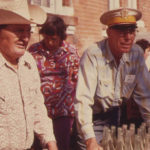We run our website the way we wished the whole internet worked: we provide high quality original content with no ads. We are funded solely by your direct support. Please consider supporting this project.
Why Do Some Prayers Go Unanswered?
All of us have prayed for things and have been left wondering why God did not answer. Clearly, our prayers don’t all bring about what we ask for. It has been popular to say that God always answers prayer with one of three responses, “Yes,” “No,” or “Not Yet”. But isn’t the reality a little more complicated than that?
Why does one prayer get answered and another is not? Is God’s will the only factor?
In Greg’s book Is God to Blame? he lays out nine variables that influence or affect outcomes to prayer. There is no way to include the full explanation of each, but this provides a basic summary:
1. God’s will. I have argued [in this book and elsewhere] against appealing to God’s will as the only explanation for why prayer is or isn’t answered. Yet God’s will is the most basic variable affecting whether prayers are answered. John says we should be bold in prayer, having confidence that if we ask anything according to his will he hears us (1 John 5:14). …
2. The faith of the person being prayed for. Everywhere Jesus went, multitudes of people were healed and delivered, except in his own hometown. Mark explains why: “he could do no deed of power there, except that he laid his hands on a few sick people and cured them. And he was amazed at their unbelief” (Mark 6:5–6). …
3. The faith the people praying. Many times in the ministry of Jesus the effectiveness of prayer was associated with the faith of the people praying for others, not the faith of those being prayed for. For example, when a group of people took the trouble to dismantle a roof and lower a paralyze friend into an overcrowded room so Jesus could heal him. Luke says that Jesus “saw their faith” and thus healed their friend (Luke 5:20). …
4. Persistence of prayer. A fourth factor in the outcome of prayer is our persistence. We have no reason to think that spiritual work is all that different than physical work, and we know that physical work often takes persistence. Some rocks can be lifted in a minute, but others take hours. So it is in prayer. … (See Luke 11:5-8)
5. The number of people praying. When dealing with an important matter, most people of faith instinctively ask others to pray with them. The assumption is that with more people praying, it’s more likely that this matter will be resolved in accordance with the prayer. The assumption is reasonable. … (See Ephesians 6:19-20; Colossians 4:3–4)
6. Human free will. A sixth variable to take into account is the free will of the people we are praying for. For example, we may pray for someone’s salvation, and this will undoubtedly increase the influence of the Holy Spirit in his or her life. But God will not—and given the kind of world he has created, cannot—simply override a person’s free will to answer our prayer. Indeed if God could simply override the free will of people to get them saved, we have every reason to believe everyone would be saved (see one Timothy 2:4–6, 4:10; two Peter 3:9)!
7. Angelic free will. Human beings are not the only agents in the cosmos who possess morally responsible say-so. Spirit agents (referred to in Scripture as angels, gods, demons, principalities, powers, authorities, rulers) also possess free will. Their activity is another variable that influences prayer.… (See Daniel 10:12-13; 1 Thessalonians 2:17–18).
8. The number and strength of spirit agents. There is another variable in the role that spirit agents play in affecting the outcome of our prayer. In the physical world we have no trouble accepting that the number of the forces on either side of a battle is a significant factor in deciding its outcome yet we Westerners customarily ignore this piece of common sense when it comes to thinking about spiritual warfare. … (See Luke 11:24-26)
9. The presence of sin. After suffering a terrible defeat, Joshua and the elders of Israel fell on their faces in prayer to God. But the Lord said to Joshua, “Standup! Why have you fallen on your face? Israel has sinned” (Joshua 7:10–11). What was required in this situation was not prayer but confronting sin. This episode illustrates the principle that in some cases God wants us to do something (e.g., repent or confront sin) before he will hear our prayer. For example, no one would be surprised if God told an abusive husband that prayer for his wife’s love is useless until he stops abusing her!
Category: Q&A
Tags: Is God to Blame?, Prayer
Topics: Free Will and the Future, Hearing God, Prayer, Providence, Predestination and Free Will
Related Reading

When God Needs an Intercessor
In the previous two posts, we have been exploring biblical narratives that point to how God’s knowledge is temporally conditioned and thus supports an open view of the future, or open theism as it is commonly called. The first addressed how God regrets and the second how God discovers. In this post, I want to…

God’s Heart to Prevent Judgment
In Ezekiel we read a passage that depicts Yahweh as warning his people about their impending punishment by saying, “I will pour out my wrath on you and breathe out my fiery anger against you” (Ezek 21:31a). As we find in several other texts, Yahweh is here depicted as a ferocious fire-breathing dragon—a portrait that…

My Car Crash and the Open View
Last Saturday night Shelley and I were involved in a rather serious four car crash on a local highway. One person was hospitalized, and I’m being treated for neck pain and an on-going dull headache. But thankfully, no one was critically injured. In any event, the crash inspired several folks to e-mail or tweet questions…

What Did Jesus Mean By Saying We “Will Do Even Greater Things Than These”? (podcast)
John 14:12-14 12 Very truly I tell you, whoever believes in me will do the works I have been doing,and they will do even greater things than these, because I am going to the Father.13 And I will do whatever you ask in my name, so that the Father may be glorified in the Son.…

Prayer When You’re Anxious
The following is adapted from a prayer exercise that Greg wrote for his book, Present Perfect. If you’re feeling anxious today (or even if you’re not anxious at all) we encourage you to spend a little time with it. As you read this, remind yourself that the only thing that ultimately matters is that you are submerged…

When Prayers Go Unanswered
Recently Frank Viola published a free e-book where 21 Christian leaders responded to the following question: Why is it that God doesn’t often answer the desperate prayers of His people for deliverance, protection, healing, etc.? You can download the free ebook by clicking here. The following excerpt is Greg’s contribution to this book: _____________________ Two very ill children are…
